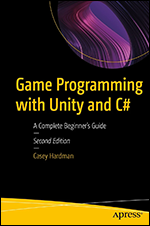Physically Based Shader Development for Unity 2017: Develop Custom Lighting Systems
- 3h
- Claudia Doppioslash
- Apress
- 2018
Benefit from the latest rendering tech developments, currently covered only in papers and talks from Siggraph, in a way any developer or technical artist using Unity can take advantage of. This book starts by introducing how shader programming works in general, the common principles of different platforms (OpenGL, Vulkan, and DirectX), and the shading languages Unity uses: Cg, GLSL, and ShaderLab.
Physically Based Shader Development for Unity 2017 discusses artistic choices, presenting various techniques (such as translucency and subsurface scattering) and BRDFs (Oren-Nayar, Cook-Torrance, and Ashikhmin-Shirley), and what they can be used for. Finally you’ll cover the importance of optimizing your code by developing approximations, which achieve similar end results, but are computationally cheaper.
By the end of your journey you’ll be able to develop the look of your game or Unity-rendered animated short so that it looks both unique and impressively realistic, thanks to your own custom lighting system.
What You Will Learn
- Master shader programming
- Gain all you need to know about physically based shading
- Take almost full control of the shader subsystem
- Discover what you can achieve with that control
- Implement a custom physically based lighting system and examine the logic behind every choice
Who This Book Is For
Most game developers (both indie and AA) that use Unity and technical artists who are responsible for the final look of a game.
About the Author
A Game Developer, Functional Programmer, and Speaker at various programming conferences, Claudia Doppioslash writes about Graphics Programming in Unity and in Rust and about Functional Programming. She’s been programming for many years now: starting from mobile development for iOS and Android, she went on to Game Development, spending most of her time developing custom shader lighting systems for Unity. Now she’s applying Functional Programming to the front-end, with Elm, Purescript and Haskell. She is a moderately Smug Lisp Weenie, and she hasn’t given up making Functional Programming useful for Game Development yet.
In this Book
-
Introduction
-
How Shader Development Works
-
Your First Unity Shader
-
The Graphics Pipeline
-
Transforming Coordinate Spaces
-
Your First Unity Lighting Shader
-
Specular Implementation
-
Surface Shaders
-
What is Physically Based Shading?
-
Making a Shader Physically Based
-
Post-Processing Effects
-
BRDFs Who's Who
-
Implementing a BRDF
-
Hooking into the Standard Shader
-
Implementing Advanced Techniques
-
Making Shaders Artists Will Use
-
Complexity and Ubershaders
-
When Shading Goes Wrong
-
Keeping up with the Industry





